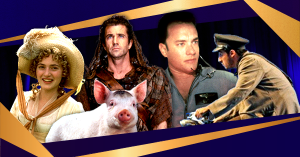Total Recall: Movies With Matching Titles
With Safe hitting theaters, we run down a dozen titles shared by multiple films.
Safe isn’t just the title of this weekend’s Jason Statham MMA action thriller, it’s also the name of a critically acclaimed Todd Haynes drama starring Julianne Moore. This isn’t the first time multiple movies have shared a title, of course, but noticing the latest example on the release schedule got us thinking — and by the time we’d finished thinking, we had ourselves a list. From Oscar winners to infamous duds, here are 24 movies with only a dozen titles between them. It’s time for Total Recall!
The Accused (1948, 1988)
100%,
93%They’re separated by nearly 40 years — and completely different storylines — but the 1988 The Accused, like its 1949 predecessor, has a plot set in motion by an act of sexual violence. Key difference: When a college professor (played by Loretta Young) suffers an attempted rape in the 1949 film, she brains her attacker with a tire iron and spends the rest of the movie battling her guilt. In the 1980s, things got a lot more brutal for Jodie Foster — and her character dealt with the repercussions in court, for better or worse.
Bad Boys (1983, 1995)
89%,
46%A dozen years before Will Smith and Martin Lawrence blew up half of Florida in Michael Bay’s Bad Boys, Sean Penn starred in a gritty juvie drama with the same name, proving he had the dramatic chops to do more than antagonize poor old Mr. Hand. Critics loved the 1983 Boys a lot more than Bay’s film, but Smith and Lawrence took the box office crown, racking up more than $140 million in worldwide grosses and spawning a franchise that, although it’s lain dormant for nearly a decade, may yet produce a Bad Boys III.
Betrayed (1954, 1988)
,
36%More than 30 years before Debra Winger played an FBI agent whose mission to infiltrate a group of Iowan white supremacists is complicated when she (whoops!) falls in love with local racist Tom Berenger, 1954’s Betrayed starred Clark Gable and Lana Turner as a spy and the suspected Nazi he’s ordered to keep tabs on. Which one gives you more bigoted bang for your buck? It’s hard to argue with Gable and Turner — or the film that ultimately inspired Top Secret! — but the 1988 version is no slouch either, boasting direction from Costas-Gavras and a supporting cast that included the inimitable John Mahoney.
Blue Steel (1934, 1990)
,
75%In 1990, as in 1934, the title Blue Steel referred to firepower, but these two films are a pretty compelling case study in Hollywood’s changing attitude regarding who could safely wield it. The original Steel is a pretty standard 1930s Western, starring John Wayne as a U.S. marshal pursuing a bandit, while its 1990 counterpart stars Jamie Lee Curtis in a creepy Kathryn Bigelow thriller about a rookie cop who unwittingly falls for the successful broker/secret psycho killer (Ron Silver) who tampered with a crime scene and cost Curtis her badge. While it’s hard to beat the Duke, it’s Curtis’ Blue Steel that really hits its target, offering a few nifty twists on a very familiar formula.
Crash (1996, 2005)
65%,
73%One is an attempt to use a star-studded cast and narrative gimmickry to make audiences think about institutionalized racism in modern-day America and the other is a chilly softcore flick about a couple with a fetish for automobile accidents, but other than that, 1996’s Crash and its 2004 counterpart are exactly the same. Oh, wait, another key difference: The 2004 version picked up an Academy Award for Best Picture that’s still being debated today, while the 1996 Crash skidded out at 57 percent on the Tomatometer.
Employee of the Month (2003, 2006)
11%,
20%If we told you two movies shared the title Employee of the Month and asked you to guess which one had the lower Tomatometer, you’d probably pick the one that starred Jessica Simpson and Dane Cook. But not so fast: Although Simpson and Cook certainly took a beating from reviewers, tumbling all the way to 20 percent on the meter with their alleged retail comedy, it’s the 2003 Employee that takes turkey honors with a lowly 11 percent. Starring Matt Dillon and Christina Applegate as a fired bank employee and the woman who dumps him, it found its only friend in Filmcritic’s Christopher Null, who couched his three-star review in the extreme qualification that it “has moments a-plenty both cute and clever, but it doesn’t quite generate enough interest to make you really vest yourself in the plot.”
Fair Game (1995, 2010)
15%,
78%On paper, the 1995 Fair Game looked like a blockbuster — the big-screen debut of Cindy Crawford, acting opposite a Baldwin brother in the action thriller saga of a lawyer who runs afoul of an ex-KGB mobster. In reality, of course, it was critically dogpiled and sputtered out at $11.5 million at the box office — less than half the earnings of 2010’s Fair Game, a solidly reviewed arthouse thriller starring Sean Penn and Naomi Watts as real-life diplomat Joseph C. Wilson and his outed CIA agent wife, Valerie Plame. Turns out having Cindy Crawford in a tank top on your poster isn’t the ticket to cinematic immortality. Who’d have guessed?
Gladiator (1992, 2000)
31%,
80%Say “Gladiator,” and most people are going to think you’re talking about Russell Crowe’s Oscar-winning smash about a Roman general who loses his family and his freedom after the emperor dies and his devious son (Joaquin Phoenix) takes control of the empire. And that’s probably just the way Cuba Gooding, Jr. likes it, given the commercial indifference and rash of negative reviews that greeted his Gladiator, a 1992 boxing drama about two kids from the wrong side of the tracks who have to face each other in the ring after getting mixed up with an unscrupulous promoter (Brian Dennehy).
Glory (1956, 1989)
,
95%Feeling the need for some cinematic Glory, but not in the mood for an Oscar-winning Civil War epic? We have just the movie you’re looking for: One of several unsuccessful forays into adult roles for child actor Margaret O’Brien, 1956’s Glory follows the efforts of a horse owner and her grandmother to take their steed from dud to Kentucky Derby winner with the help of a plucky trainer (Walter Brennan, in the later stages of an Oscar-winning career). Sadly, if you’re looking for a movie that will give you Matthew Broderick resplendent in a jaunty military cap and mustache, you still really only have one choice.
Heat (1972, 1987, 1995)
100%,
38%,
84%Well, “heat” is definitely one of the more evocative words in the English language, so it makes a certain amount of sense that filmmakers would be drawn to it when trying to figure out a title. Here we have not two, but three movies named Heat: the 1995 Michael Mann action thriller about a cop (Al Pacino) and the crafty crook (Robert De Niro) he’s sworn to bring down, the infamous 1987 turkey about a bodyguard (Burt Reynolds) pursuing a vendetta against a sadistic mobster (Neill Barry), and the 1972 Warhol production about a gigolo (Joe Dallesandro) who beds a fading film star (Sylvia Miles) in an effort to further his acting career. Imagine the disappointment and confusion if you rented the wrong one?
Kicking and Screaming (1995, 2005)
56%,
41%One is the art house comedy debut of the ampersand-friendly director who’d go on to helm The Squid & the Whale; the other is a soccer-themed family comedy from the guy who brought subtitles back to the cineplex with Casa de Mi Padre earlier this year. Not the most similar films in the world, in other words, but both Kicking & Screamings have one thing in common: Neither represents a critical highlight for its creative principals, who had to endure slights like “boring” and “barely watchable.” Maybe the title’s cursed?
Twilight (1998, 2008)
61%,
48%In terms of pedigree, the two Twilights couldn’t be more different — the 1998 version (forced to ditch its original title, The Magic Hour, because Magic Johnson was debuting a talk show by the same name) was a low-key P.I. story starring a cast of wily vets that included Paul Newman, James Garner, Gene Hackman, and Susan Sarandon. Despite all that star power, it faded from theaters without making much of an impression, and by the time Stephenie Meyer’s saga of young vampires and werewolves made its way to the screen 10 years later, few filmgoers remembered that it shared a title with a decidedly less fang-friendly film.
Take a look through the rest of our Total Recall archives. And don’t forget to check out the reviews for Safe.






